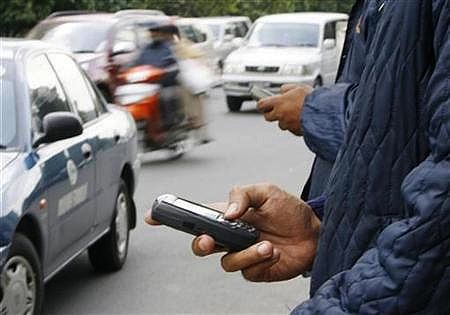In a significant breakthrough, the defence ministry and the department of telecommunications, or DoT, have resolved the contentious issue of spectrum swapping.

Accordingly, the armed forces will cede 15 MHz in the 2,100 MHz band in return for an equal amount of spectrum in the 1,900 MHz band.
This spectrum DoT hopes to sell to telecom services companies in February. This has averted the impending crisis in the sector.
Spectrum that was allotted in 1995 runs out next year. The incumbents are required to surrender that spectrum and purchase airwaves afresh in the auction.
The auction is open to others also. Four or five buyers are expected to take part in the auction in each circle (the country is divided into 22 telecom circles).
Spectrum will be sold in lots of five MHz each. The spectrum that will be given up by the incumbents isn't much.
Of the 18 telecom circles for which airwaves will be auctioned, it will be enough to accommodate three operators in only five circles.
In six circles, there will be slots for only two; and in seven, it will be enough for just one operator.
There is some spectrum available in the 1,800 MHz band, but contiguity is a problem as the armed forces hold chunks of it here and there.
In addition, there is no availability of spectrum in this band in eight circles, including large ones like Karnataka, Maharashtra and Punjab.
This shortage will now be bridged as the defence ministry has agreed to vacate 15 MHz in the next band that is suited for commercial use: 2,100 MHz.
The matter had been hanging fire for over four years now. Neither DoT nor the armed forces were ready to budge. As Rahul Khullar, chairman of the Telecom Regulatory Authority of India, told this newspaper earlier, the tussle needed a "political resolution".
The settlement came about after Manohar Parrikar, the new defence minister, discussed the matter with Ravi Shankar Prasad, the communications and information technology minister.
That the matter was resolved within days of Mr Parrikar taking over the defence portfolio suggests there may have been some prodding from the top.
Had this not happened, the industry would certainly have landed in serious trouble. With limited spectrum, the bids would have been aggressive.
Apart from the incumbents, those which want to offer high-speed data services to their subscribers are expected to take part in the auction.
As a result, all would have overpaid for spectrum. Companies are still struggling with the debt they had contracted to buy spectrum for third-generation, or 3G, services some years back.
Tariffs are still low, though there has been some correction in the last few quarters. Any additional debt at this point would have broken the industry's back.
Apart from other things, this would have put a spanner in the government's Digital India campaign.
Whatever be the reason, the government has shown good sense by moving ahead.











